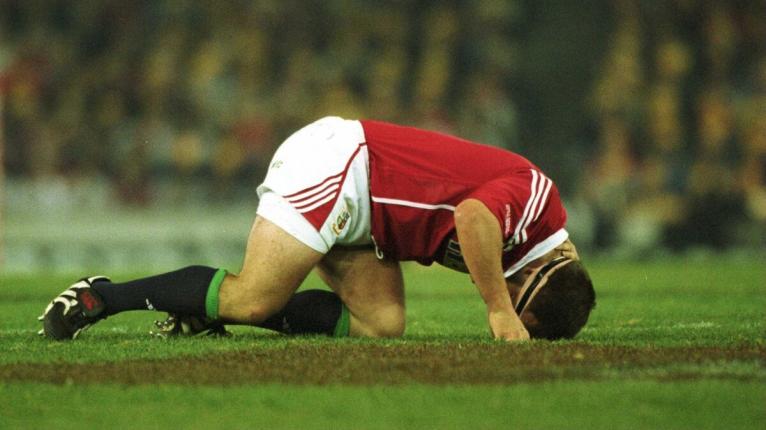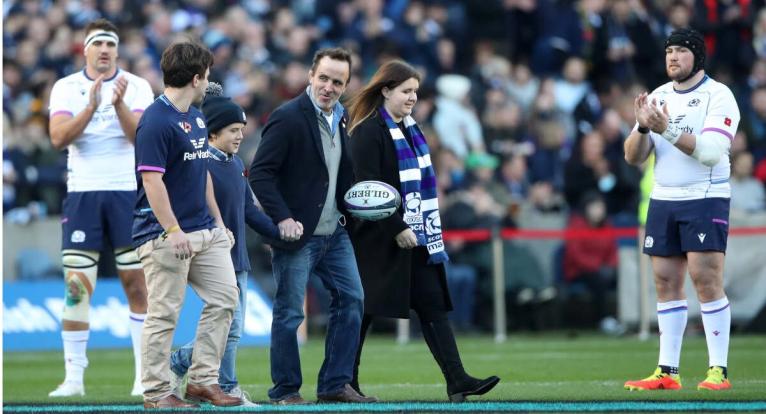Tom Smith: The shy Scotland captain who did his talking on the pitch

Tom Smith was never one to run his mouth. Deeds rather than words were this hardy prop’s preferred method for inspiring others to follow where he furrowed.
But when he did speak, the respect was instantaneous. Former team-mates later recalled that when the famously-shy Scotland captain – who died on April 6, aged 50 – rose to his feet, a hush descended and everybody listened.
And for good reason given the height his deeds took him to. A member of Scotland’s last Five Nations-winning side of 1999 and a member of the successful British and Irish Lions squad which toppled then-world champions South Africa in 1997, Smith was a proper rugby player.
Although born in London, it was in the foothills of the Highlands that Scottish Rugby Hall of Fame inductee Smith received his education in the game.
After his English father died when he was just six, his Scottish mother later sent him to board at the Rannoch School in Perthshire – although Smith’s description of its location as being “absolutely the middle of nowhere” was probably just as accurate.
With the school’s pitches frozen solid for three months of the year, he and his class-mates would work on their fitness through winter by running up and down hills.
“There were times when it was pretty tough and cold out here but at the end of the day rugby is a hard game and you need to be tough to play it,” he said.

There were harsher lessons to come when he joined his first amateur side Dundee High School FP.
“You find out about survival the hard way,” said Smith in a 2009 interview. “When I joined my first senior club in Dundee, there was an old prop called Danny Herrington, a bit of a local legend, who basically shoved my head up my arse in training, twice a week every week for what seemed like years.
“Now, that’s what you call a learning curve. Those training sessions were my classroom.
“Danny took the view that a young prop should have his share of bad experiences before trying to inflict them on other people.”
He had to endure a fair share of bad experiences due to his epilepsy condition – including one on the morning of a match against England having graduated to the Scotland set up.
“I played a Calcutta Cup match after having a seizure on the day of the game and believe me, it wasn’t the best idea I ever had,” he said.
Those early hardships shaped the gruff side that every prop requires.
Scotland & @lionsofficial prop Tom Smith sadly passed away earlier today aged 50.
A hugely respected player, Tom will be greatly missed by everyone associated with rugby in Scotland and throughout the game.
All our thoughts are with Tom's family and friends at this time. pic.twitter.com/nBLlDq7dH1
— Scottish Rugby (@Scotlandteam) April 6, 2022
But Smith was not just about the grunt and shunt. He was very much the modern-day player who could throw the kind of instinctive offload and even the odd dummy that a flamboyant number 10 would be proud of.
Named in Sir Ian McGeechan’s Lions squad to face the Springboks in 1997 despite having played just three times for the Scots, he would go on to play in all three Tests as the tourists won a thrilling series 2-1.

He retained his place four years later in Australia, again starting all three clashes in a series won 2-1 by the Wallabies.
But two years later he was celebrating again, as Jim Telfer’s Scotland side won the final edition of the Five Nations.
The honour of captaining his nation was first bestowed during the 2001 autumn tests while the following year his talents were recognised as he was named among a World XV.
He had longevity, too. He started his professional club career with Caledonian Reds in 1996 before racking up stints at Glasgow Caledonians and Brive. He brought the curtain down on his playing career in 2009 after an eight-year spell at Northampton, aged 37.
He returned north of the border shortly afterwards as he moved into coaching with Edinburgh, then enjoyed three years in France from 2012 as he was recruited to look after Lyon’s forwards.
But Smith – who had faced and bested some of the toughest figures in world rugby during his playing career – was left to admit in November 2019 that he was facing his biggest challenge yet after being diagnosed with stage 4 cancer, with tumours in his colon, brain and liver.
Smith is survived by his wife Zoe and three children Angus, Teddy and Amelie.






























Comments on RugbyPass
The movement of quality players back to SA is remarkable.
1 Go to commentsInteresting article, Nic. Am enjoying seeing the Rebels doing well, partly just to spite those who are working to wipe them off the face of the Australian rugby planet. But it is also good to see a team with somany good players beginning fire. LSL has benefitted so much from his move up to Northampton for the one year. I wonder why he did not stay on for another year. Does he now looks north and see his teammates of last year now doing so well, and have some regrets.
44 Go to comments“Over 80% of the World Cup squad are over 30” No it isn’t lol
2 Go to commentsTyrel Lomax the best AB prop since Carl Hayman. Absolutely destroyed the Boks in RWC Final and is monstering allcomers in Super this season. Should be a monster battle vs touring Poms, always deliver a power pack.
1 Go to commentsEye gouging seems like such a strong term for what can only be described as a poke in the eye. When I think of eye gouging I think of someone trying to intentionally pop someone’s eyeball out. it’s like calling a high-tackle attempted decapitation.
3 Go to commentsGreat article. No insights to add, just wanted to say that. :)
1 Go to commentsLeinster are going to win the world cup.
13 Go to commentsSuper Rugby desperately needs to lose at least 2, but up to 4 teams. Rebels quietly going bankrupt would have made that a bit easier. Teams like the Rebels and Force serve only to weaken Australian Rugby and Super Rugby more widely. In 13 years in the comp the Rebels are yet to win more games than they lose in a season, have never finished in the top half of the competition, and have come dead last a number of times. The Western Force, barring a brief stint of mediocrity under John Mitchell from 2007-2009 have been even worse. Sadly it’s hard to see a future for Moana Pasifika in Super Rugby. Likewise I think the writing is on the wall for the Highlanders, it’s hard to see how NZ rugby can continue to support 5 SR teams, and population distribution suggests one team in the south island would make the most sense.
44 Go to commentsNice that Connor Evans is happy to stay on here, that JD Schikerling is returning and Steven Kitshoff. Dobbo is careful to bring back just anybody but having a new financial lease of life, it has made the Stormers a more attractive club. On top of being good quality, having the financial backing helps a lot
1 Go to commentsEngland-qualified too, I believe.
1 Go to commentsThis might turn out to be emblematic of a real issue in Irish rugby. Ireland have one of the best -if not the best - senior sides in the world, and one of the best under 20s sides as well, but don’t seem to be giving graduating under20s players many opportunities to break through into URC starting lineups. There is a risk that a lot of the junior talent they are developing will either be wasted, or lost to other nations.
1 Go to commentsYou ask good questions, Nick. The group who have put together the proposal to play out of Tarneit and participate in the growing of the ground’s capacity are not a bunch of white knights who have been dragged in post-crisis; they were around whilst the Rebels accummulated $23m in debt. Why do we come up with ideas that might make the franchise affordable after it’s broke and not when it might have prevented the trainwreck this offseason was? As for Gordon/Kellaway v Lolesio/Wright, they are both good options. I think the former are better rugby players but the goal kicking of Noah may be decisive when Schmiddy makes his choices. I know Harry Jones has the hots for Edmed but I think it’s one of his few poor choices and he and Jorgensen aren’t close to the other pairs. By coincidence, the wife and I went into town over the weekend to watch Brian Cox and Patricia Clarkson in Long Day’s Journey into Night. Beautifully acted but it was 3.5 hours in the chair and very hard work. Like the Rebels, there were only small bursts of joy to go with a lot of bad news and a depressing story line. In the end, I was hoping it would end and I could give my sore butt a break. Again, familiar.
44 Go to commentsGood decision, very good player but not international quality. But so was Jamison Gibson Park …..
3 Go to commentsLoose forwards always look good going forward and winning. It’s the same loose forwards for the Crusaders and the Canes this year as last year. Too much of the shiny new things getting noticed here while older consistent ones getting bagged. It’s early days. Calm the farm.
6 Go to commentsThanks Nick, and on the money. We tend to be apathetic until something REALLY BAD happens, then we aren't! At least this applies to the Reb players and coach, if not the spectators. They seem to be getting very quick ball at times. Have they altered something, or is it just all of the skills coming together at the right time? It seems almost the opposite of the Reds, who started the season with quick ball, but haven't been showing that in the last 3 losing games. Is it attitude (McDermott hasn't looked “right” to me for 3 weeks), or something else?
44 Go to commentsGood summary. As said, Sevu Reece has been electrifying for the Crusaders. Great try and he has been everywhere. Amazing he is now equal with Caleb Ralph , club record of 52 tries for the Crusaders. That record beckons. Good to see Dallas McLeod getting regular starts at last. A big few weeks are ahead.
6 Go to commentsGood article/interview.As was said Christian Lio-Willie was barnstorming when he came on for the Crusaders. What happened at the end, self-explanatory.Captain fantastic Scott Barrett is due back soon as well, once they are back from Aussie. Great to see Ethan Blackadder back last week.
1 Go to commentsYou must have been watching one team, Andrew - and even then you missed the brightest star in the Chiefs pack - Naitoa Ah Kuoi, 2 turnovers, genuine line-out presence and grunt around the field, and the soft hands of a back.
6 Go to commentsHaha what a crock of sh!t these headlines are. Moorby’s best year was that first. Still doesn’t seem to have the same game about him as when he was fresh but has bounced back well this season to be playing consistent tight accurate footy
3 Go to commentsIt’s even dumber than Bernard Foley not kicking the penalty to touch in the Melbourne Bledisloe in 2022.
3 Go to comments